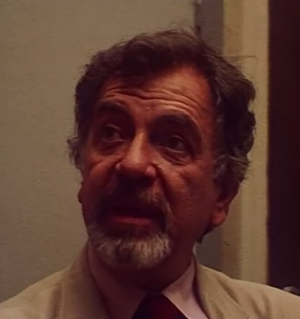Eric Rouleau
(journalist, writer, diplomat, spook?) | |
|---|---|
 | |
| Born | Elie Raffoul 1 July 1926 Cairo, Egypt |
| Died | 25 February 2015 (Age 88) Uzès, France |
| Spouse | Rosy Rouleau |
"The most influential journalist covering the Near East, not only in France, but around the world." Wrote a working paper entitled The West, The Gulf and The Iraqi-Iranian War for the 1984 Bilderberg, but is not listed among the attendees.
| |
Eric Rouleau was a journalist, writer, and diplomat.[1] He was French ambassador to Tunisia from 1985 to 1986, and to Turkey from 1988 to 1991. According to an obituary written by Alain Gresh, he was "the most influential journalist covering the Near East, not only in France, but around the world."[2] Rouleau wrote a working paper entitled The West, The Gulf and The Iraqi-Iranian War for the 1984 Bilderberg, but is not listed among the attendees.[3]
Early Life
Elie Raffoul was born into a French-speaking Jewish family in Heliopolis, a suburb of Cairo, Egypt, occupied at the time by the British colonial power since 1882.[4]
His father, born in Aleppo, raised in the schools of the Alliance Israélite Universelle (AIU) and a supporter of the integration of Jews and secularism, was a lover of French literature and France, land of freedom and justice - a passion shared by many French-speaking Jews in Egypt; he broke down in tears at the announcement of the capitulation of France on June 10, 1940. He was a not very religiously observant but respected the great holidays of Judaism. Every five years, he took his family for a long vacation to Lebanon and spent a few days in Tel Aviv where his brother lived.
As a teenager, Elie decided to become a rabbi and studied the sacred texts in evening classes at a synagogue, but a little later lost his faith and became an atheist. He frequented for a year the Zionist movement of extreme left of Hashomer Hatzair (The Young guard) where one practices sports, follows courses of Jewish history and takes part in debates.
His father would like his son Elie to enter an insurance company to ensure a comfortable future, but he chose differently.[5] At 17, Eric Rouleau took courses at the Faculty of Law in Giza (Cairo) and joined the Egyptian Gazette in 1943, landing an interview with the founder of the Muslim Brotherhood, Hassan Al-Banna. On his campus, he was introduced to Marxist thought and then took part in meetings and demonstrations of the National Committee of Workers and Students.
In France
In 1952, under duress, he emigrated to France and joined Agence France-Presse, then in 1955 Le Monde. Gamal Abdel Nasser offers him a scoop interview in 1963, in which he announces the gradual release of communist prisoners. This interview gave him great prestige with the leaders of the region. He also covered the Iranian Revolution for several years at Le Monde.
As an adult, he married Rosy, and at the end of the 1960s, returned with her to Heliopolis (Cairo) to find in his birth home a family of Palestinian refugees with whom he would remain friends[5] .
During his years of journalism, Eric Rouleau traveled to the four corners of the world and particularly the Middle East. He interviews the most significant figures in history: King Hussein of Jordan, David Ben Gurion ,Moshe Dayan, Golda Meir, Saddam Hussein, Yasser Arafat, Muammar Gaddafi, Ayatollah Khomeini, Yitzhak Rabin, Shimon Peres, Hafez al-Assad, etc. Often, these political leaders within a conflict ask him to act as intermediaries between them, to transmit messages or proposals, as an Arabic-speaking diplomat. Some jews referred to him as a traitor, a "self-hating jew” [5]. In his work, he supervised in the years 1960-1970 all the analyzes of international policy which appeared in Le Monde.
French President François Mitterrand charged him in 1984 with an informal diplomatic mission to Libyan President Muammar Gaddafi to negotiate the withdrawal of Libyan troops installed in Chad.[6] The mission was successful, and he was appointed as French ambassador to Tunisia from 1985 to 1986, an important position since it was then the headquarters of the PLO and the place of residence of Yasser Arafat. Just before the 1986 legislative elections, he was sent on a confidential mission to Tehran to negotiate – without success – the release of French hostages in Lebanon.[7] Rouleau also served as French ambassador to Turkey from 1988 to 1991.[8]
Éric Rouleau was then appointed ambassador to Turkey from 1988 to 1991.
Rather pro-Palestinian and desiring the resolution of the Israeli-Palestinian conflict, he was a member of the sponsoring committee of the Russell Tribunal on Palestine, whose work began on March 4, 2009.[8]
He is also one of the writers of the monthly Le Monde diplomatique..
He died in Uzès in February 2015.
References
- ↑ http://www.tdg.ch/monde/europe/Le-journaliste-et-exdiplomate-Eric-Rouleau-est-decede/story/15613981
- ↑ https://english.alaraby.co.uk/opinion/eric-rouleau-great-journalist-near-east
- ↑ File:Bilderberg-Conference-Report-1984.pdf
- ↑ Entregent et agilité polyglotte »", Le Monde, 2-3 décembre 2012, p. 17
- ↑ a b c Eric Rouleau, Dans les coulisses du Proche-Orient..., op. cit., Preface
- ↑ Lacouture, Jean (1998). Mitterrand: une histoire de Français (in French). II: Les Vertiges du sommet. Paris: Éditions du Seuil. pp. 211–212. ISBN 2-02-035167-6.
- ↑ Favier, Pierre; Martin-Roland, Michel (1991). La décennie Mitterrand (in French). 2, Les épreuves : 1984–1988. Paris: éd. du Seuil, coll. « L'épreuve des faits ». pp. 545–549. ISBN 2-02-012891-8.
- ↑ a b http://www.afrique-asie.fr/component/content/article/28-politique31/5277-de-l-emancipation-a-la-culture-de-resistance.html
Wikipedia is not affiliated with Wikispooks. Original page source here